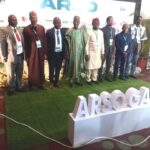By Felix Khanoba
The National Automotive Design and Development Council (NADDC) is actively engaging with development banks and other partners to secure funding for Nigeria’s auto industry.
According to NADDC Director-General Oluwemimo Joseph Osanipin, the funding gap in the sector is estimated to be between $1 trillion and $5 trillion.
He made this known during an interactive session with the Commerce and Industry Correspondents Association of Nigeria (CICAN) in Abuja.
Highlighting the crucial role of funding in the growth of the auto industry, Osanipin noted that inadequate funding has been a significant obstacle to the sector’s development. He mentioned that the NADDC is in advanced discussions with both local and international financial institutions to address this issue.
“We are exploring various funding options, not only with the Development Bank but also with other potential sources, including international partners,” Osanipin stated. “We are discussing ways to secure funds specifically for the auto industry.”
Regarding the magnitude of the funding required, Osanipin indicated that the sector needs between $1 trillion and $5 trillion. He emphasized that banks and partners are showing interest in the funding proposals.
“We are not investors; our role is to initiate the process. For the sector to achieve its growth potential, an estimated $1 trillion in funding is necessary, though it can be distributed over time,” he explained. “Initially, we can allocate around $1 billion.
” These discussions are already underway with our funding partners. This funding is intended for industry players like Innoson, PAN in Kaduna, and JAC. For instance, Innoson might need several million dollars to advance to the next level. These auto firms require substantial funding, and we are working to facilitate that.”
Osanipin also outlined the Council’s plans for the accreditation and certification of workshops converting vehicles to Compressed Natural Gas (CNG). He stated that the Council would use the National Occupational Standard (NOS) to train Nigerians for this purpose.
“The first step in promoting CNG is ensuring the availability of CNG vehicles, which is why we developed NOS and obtained NABTEB certification approvals. We will use this curriculum to train Nigerian engineers,” he said.
He further explained the accreditation process for workshops: “Workshops can apply for accreditation through our website, detailing their facilities and personnel. To certify the personnel, they must demonstrate capability and have undergone training using our curriculum. Once trained and certified, the workshops can be accredited for conversion and maintenance.”
These initiatives by the NADDC are aimed at addressing the funding and infrastructure needs of Nigeria’s auto industry, setting the stage for significant growth and development in the sector.



